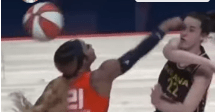Why does the WNBA allow stars making the league popular to become the target of blatant fouls. Are the referees doing their jobs? Should enforcers be brought on teams for the purpose of protecting stars or will the referees start doing their jobs?

Basketball Game Tickets and Basketball Schedule
Officiating inconsistency in the WNBA has been a known issue, and it’s a combination of a few factors.
Why is WNBA officiating considered poor or inconsistent?
- Small Pool of Officials
- The WNBA has a smaller number of referees compared to leagues like the NBA.
- This limits competition and accountability, and means the same refs often work multiple games with less rotation.
- Fewer referees also means less specialization and mentorship at the highest level.
- Lack of Full-Time Refs
- Many WNBA refs are part-time, working in other leagues (college, G-League, overseas) during the WNBA offseason.
- In contrast, NBA refs are full-time professionals with year-round training, reviews, and evaluations.
- This affects consistency, preparation, and professional development.
- Resource Allocation & Investment
- The WNBA, while growing rapidly, still operates on a much smaller budget than the NBA.
- This means less funding for referee development, training camps, performance reviews, and use of advanced tools like replay centers.
- The NBA Replay Center is robust and involved in constant training — the WNBA’s equivalent infrastructure is less sophisticated.
- Game Speed & Physicality
- The WNBA has gotten faster and more physical in recent years.
- As the athletes evolve, if officiating doesn’t keep pace, missed or inconsistent calls become more glaring.
- Especially with new rule interpretations around contact, flagrant fouls, and freedom of movement, refs sometimes struggle to adapt on the fly.
- Limited Public Accountability
- The NBA publishes Last Two Minute Reports for close games, detailing officiating errors — but the WNBA doesn’t have a consistent, transparent public audit system.
- Without this, it’s harder to hold officials publicly accountable or push for officiating improvements.
Players and Coaches Speak Out
Some of the league’s biggest stars — like A’ja Wilson, Breanna Stewart, and Arike Ogunbowale — have openly criticized officiating after games. Many players feel the inconsistencies affect not just game flow but player safety.
Is Refereeing Improving?
The league has said it’s working on referee development and reviewing officiating practices. With viewership up and fan scrutiny increasing, there’s more pressure than ever for the WNBA to invest in officiating quality.
